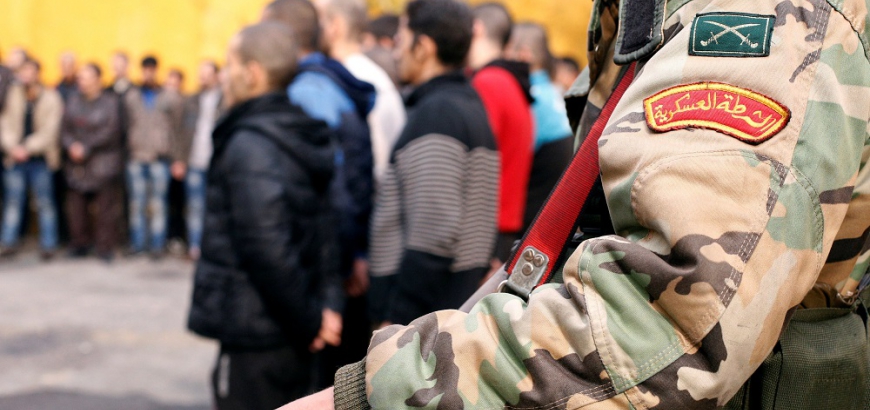The general amnesty that was issued by Syrian regime head Bashar al-Assad pushed some Syrians to hand themselves in, believing the amnesty would be in their favor. However, Syrians who handed themselves in have spoken of the hell they endured.
Assad issued an amnesty on Oct. 9, 2018, for those who defected from his forces and who fled from compulsory service in the army, and the decision was welcomed by Syrians.
Moataz, a false name for a Syrian refugee who was living in Lebanon, told Alsouria Net what happened to him after he returned to Syria. He had avoided service in the Republican Guard forces before leaving the country.
Moataz said that he had been working in Lebanon in humiliating circumstances, and that when the amnesty was issued, he went back and turned himself in. After he presented himself to the military judge, he thought that the matter would be over, however, the military police of the Republican Guard arrested him and he spent 18 days under investigation, being insulted, and then was put into a fighting unit.
Moataz told Alsouria Net, “I regret turning myself in, especially given everything that’s happening around me in the unit where I was sent. I feel like I’m in a nightmare. I fled from the humiliation of alienation to a more brutal and bloody humiliation.”
Raed, another false name, also fled military conscription. He said that he stayed in his village for a year and a half, until he was called up for service. He said that with the issuance of the amnesty he turned himself in to one of the checkpoints near the city of Banyas which was under the control of the Air Force Intelligence Directorate.
Raed told Alsouria Net that he was investigated by the Air Force Intelligence for four days, describing this period has a real hell. He added that he was then transferred with people detained for various crimes to a military judge, “who gave a lecture on patriotism before releasing me. The first thing I thought of was fleeing a second time.”
When the Assad regime announced the general amnesty, loyalist media reported that the regime would cancel the calls for reserves in its forces, but regime military officials have since confirmed that the reserve calls are continuing, while loyalist media on Saturday discussed the preparation of a new list of names of those wanted for reserve service.
The Director of the Military Courts Directorate in the regime army, Brigadier General Yazin al-Homsi, sparked regime loyalist anger when he told the regime’s al-Akhbariya channel that “The Syrians who served six years before and during the October War didn’t complain.” Loyalists described this as “selling patriots and empty partisan slogans.”
An activist living in Tartous city told Alsouria Net — asking not to be named — that Homsi is continuing the trickery and prevarication that the regime has carried out towards the loyalist public. It is carrying out a new mobilization of young men, despite the many demands to demobilize groups, such as conscription groups 103 and 104. It will not demobilize these conscription groups until it meets the shortage for the number of conscripts that it wants.
The activist added, “The contents of the decree states that they are to temporarily stop cables, inspections, and arrest raids for four months for those who have fled internally and six months for those who fled abroad. After this, matters will return to the way they were before this period, so where is the amnesty?”
Hundreds of thousands of young Syrian men have fled the country since 2011, to avoid having to fight in Assad’s forces, which have resorted to conscripting a large number of Syrians who ended their compulsory service before 2011.
The shortage of men in Assad’s forces has pushed the regime to rely, to a large extent, on foreign militias, which Iran has played a major role in bringing to Syria and supporting in order to support its forces in returning areas which it had lost.
This article was translated and edited by The Syrian Observer. Responsibility for the information and views set out in this article lies entirely with the author.


